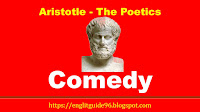Aristotle
- The Poetics
Tragic Hero
The Poetics has criticized the ideal tragic
hero in Ch. XIII. The qualities requisite to such a character are here deduced
from the primary fact that the function of tragedy is to produce the katharsis
of pity and fear; pity being felt for a person who meets with suffering beyond
his deserts; fear being awakened when the sufferer is a man of like nature with
ourselves. Tragic character must be exhibited through a plot which has the
capacity of giving full satisfaction to these emotions. Certain types of
character and certain forms of catastrophe are at once excluded to produce the
tragic effect. Aristotle designates the following qualities of a tragic hero.
In
the first place, the spectacle of a man eminently good undergoing the change
from prosperous to adverse fortune awakens neither pity nor fear. It shocks or
repels us. Next and utterly devoid of tragic quality is the representation of
the bad man who experiences the contrary change from distress to prosperity.
Pity and fear are here alike wanting. Even the sense of justice is unsatisfied.
The impression left by such a spectacle is indeed, the exact opposite of pity.
Again, there is the overthrow of the utter villain –a catastrophe that
satisfies the moral sense, but is lacking in the higher and distinctively
tragic qualities. Lastly Aristotle mentions the case which in his view answers
all the requirements of art. It is that of a man who morally stands midway
between the two extremes. He is not eminently good or just though he leans to
the side of goodness. He is involved in misfortunes, not, however, as the
result of deliberate vice, but through some great flaw of character or fatal
error in conduct. He is, moreover, illustrious in rank and fortune, the chief
motive, no doubt, for this requirement being that the signal nature of the
catastrophe may be more strikingly exhibited. We now come to the ideal
protagonist of tragedy, as sketched in this chapter. He is composed of mixed
elements, by no means supremely good but a man ‘like ourselves’. The
expression, if taken alone, might seem to describe a person of mediocre virtue
and average powers. But Aristotle must not be read in detached sections; and
the comparison of Ch. II and Ch. XV with our passage shows us that this
character, while it has its basis in reality, transcends it by a certain moral
elevation.
Since
tragedy aims at exciting pity and fear, its choice of a hero is limited to one
whose actions most produce this effect in the spectators. The tragic hero
cannot be a good man, hurled from prosperity into adversity, because his wholly
undeserved suffering arouses, not pity and fear, but a feeling of shock or
revolt: that such a thing should ever be! Nor can he be a bad man, raised from
adversity to prosperity because by his very badness he can be an utter villain,
because his fall is a matter for gratification rather than for pity and fear. There
remains but one kind of character who can best satisfy this requirement: ‘a man
who is not eminently good and just, yet whose misfortune is brought about not
by vice or depravity, but by some error or frailty’. His misfortune excites
pity because it is out of all proportion to his error of judgment, and his
overall goodness excites fear for his doom. No other character answers the
tragic purpose so well. We could wish that Aristotle had gone farther and said explicitly
that in power, even more than in virtue, the tragic hero must possess a deeper
vein of feeling or heightened powers of intellect or will; that the morally
trivial, rather than the morally bad, is fatal to tragic effect. As it is, we
arrive at the result that the tragic hero is a man of noble nature, like
ourselves in elemental feelings and emotions, idealized indeed, but with so
large a share of our common humanity as to enlist our eager interest and sympathy.
He falls from a position of lofty eminence and the disaster that wrecks his
lofty may be traced not to deliberate wickedness, but to some great error or
frailty.






















0 Comments